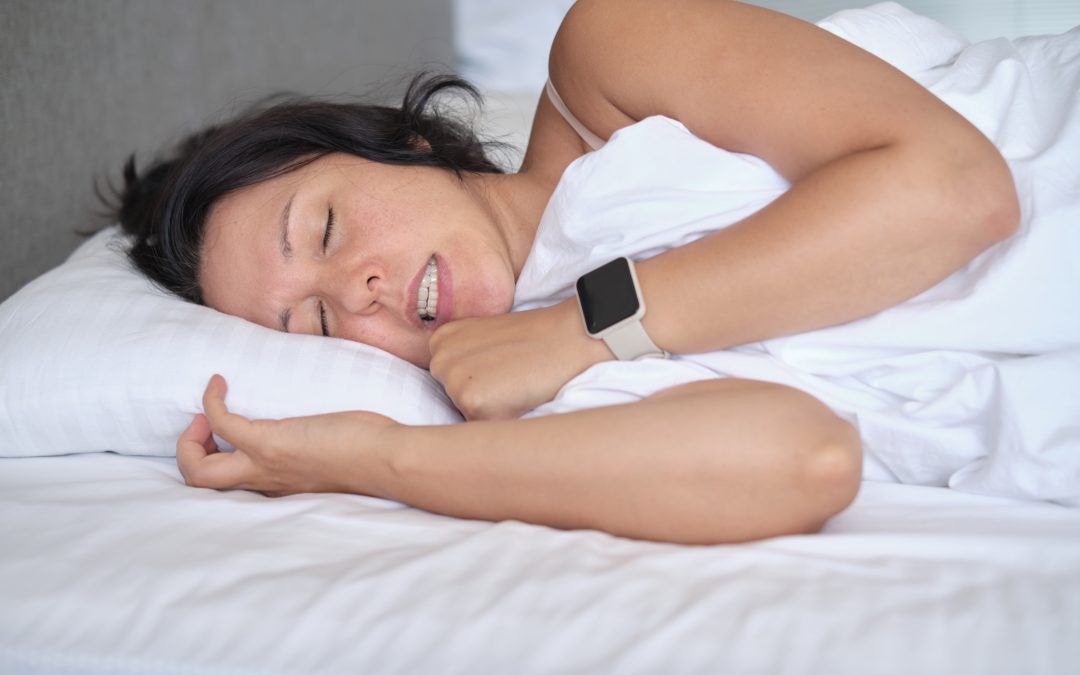Consequences of Teeth Grinding
Teeth grinding often occurs during sleep, making it challenging for individuals to even know that they have this condition. It involves the involuntary clenching, gnashing, or grinding of teeth, which can exert significant pressure on your teeth and jaw structure. Ignoring or allowing grinding to continue can lead to fractured teeth, sleep apnea, tooth decay, or the popping or clicking of the jaw while talking or eating. (temporomandibular joint syndrome – or TMJ disorder)
Common Causes of Teeth Grinding
Teeth grinding can have multiple underlying causes, and identifying the specific reason for a person’s grinding is essential for effective treatment. Although, bruxism can cause dental issues, it is important to be aware that dental issues can also sometimes cause grinding. Here are some of the common causes:
1. Stress and Anxiety
Stress and anxiety are leading contributors to teeth grinding. The pressures of daily life can present themselves as the unconscious clenching and grinding of teeth while you sleep. Managing stress through relaxation techniques can help alleviate stress and anxiety.
2. Misaligned Teeth (Malocclusion)
Misaligned teeth, also known as malocclusion, can create an uneven bite that encourages grinding. When teeth don’t fit together correctly, a person may grind them together to find a more comfortable position.
3. Sleep Disorders, Including Sleep Apnea
Sleep apnea is when you stop breathing for short periods of time during sleep, making it hard to get enough oxygen. The connection between sleep apnea and bruxism is interesting because these two problems can often co-exist and exacerbate one another. In mild and moderate cases, studies have shown that having one condition increases the chance of having the other condition as well.
We’re not exactly sure why, but it could be because sleep apnea can cause one to wake up, or be oxygen deprived which increases muscle activity triggering bruxism. Sleep apnea can also lead to stress and anxiety which in turn manifests itself as teeth grinding.
On the other hand teeth grinding can cause muscle tension, a change to your jaw position and/or disturb your sleep all of which can make sleep apnea worse. For this reason, it’s important to deal with both issues together to make sure you get better sleep and improve your overall health. Your dentist can help you determine the best way to tackle both issues and help you get a good night’s rest.
4. Medications and Drugs
Certain medications, such as antidepressants, stimulants, and recreational drugs, can lead to teeth grinding as a side effect. If you suspect your medication is causing bruxism, you should speak with your healthcare provider to explore alternative options.
5. Lifestyle Factors
Lifestyle factors, including excessive alcohol consumption, caffeine intake, and smoking, have been associated with an increased risk of teeth grinding. Reducing or eliminating these factors may help reduce or eliminate your teeth grinding.
6. Dental Issues
Dental problems, such as missing or crooked teeth, can contribute to bruxism. Dentists can address these issues through various dental or orthodontic treatments.
Symptoms of Teeth Grinding
Recognizing the symptoms of teeth grinding is crucial to catch it early before more serious harm occurs. Here are some common signs that you may be grinding your teeth at night:
Morning jaw Pain or soreness: Waking up with jaw discomfort or soreness is a frequent indicator of teeth grinding.
Tooth sensitivity: Increased tooth sensitivity to hot, cold, or sweet foods and beverages may result from enamel erosion due to grinding.
Worn Tooth Surfaces: Dentists may observe flattened, chipped, or fractured tooth surfaces during routine examinations.
Headaches: Persistent headaches, especially in the morning, can be linked to the muscle tension and strain caused by bruxism.
Earache: Some individuals with bruxism report earaches or ear pain due to the proximity of the jaw muscles to the ear.
Snoring and disrupted sleep: Snoring is often a sign of disruptive sleep. Frequent disruptions in your sleep, such as waking up repeatedly during the night, can be a symptom of teeth grinding. It can also be a cause of teeth grinding if you are waking up for other reasons such as sleep apnea.
How to Stop Grinding Your Teeth
Eliminating teeth grinding is essential not only to protect your dental health but also to ensure a peaceful night’s sleep. Here are some effective strategies to help you put an end to this problem:
Stress Management: Since stress is a common trigger for teeth grinding, practicing stress-reduction techniques such as meditation, yoga, or deep breathing exercises can be beneficial. Physical exercise, such as sports and/or walks outside can also be beneficial.
Oral Appliances: Dentists can provide custom-made nightguards or splints that you wear during sleep. These appliances help protect your teeth and jaw from the effects of grinding.
Sleep Hygiene: Maintaining a consistent sleep schedule, creating a comfortable sleep environment, and avoiding stimulants like caffeine and alcohol before bedtime can contribute to better sleep and potentially reduce teeth grinding.
Treating Underlying Issues: If sleep apnea is contributing to your teeth grinding, addressing the underlying sleep disorder through treatments like continuous positive airway pressure (CPAP) therapy can be effective.
Dental Interventions: In some cases, orthodontic treatments or dental restorations may be necessary to correct misaligned teeth or repair damage caused by bruxism.
Conclusion
Teeth grinding is a serious problem that can harm both your oral health and sleep quality. Recognizing the symptoms and causes of bruxism is the first step toward finding effective solutions. By taking proactive steps to stop teeth grinding, you can enjoy improved well-being and a brighter smile for years to come. If you suspect you are grinding your teeth, the staff and dentists at Smiles 4U can confirm this for you and provide a tailored treatment plan to address your specific needs.

